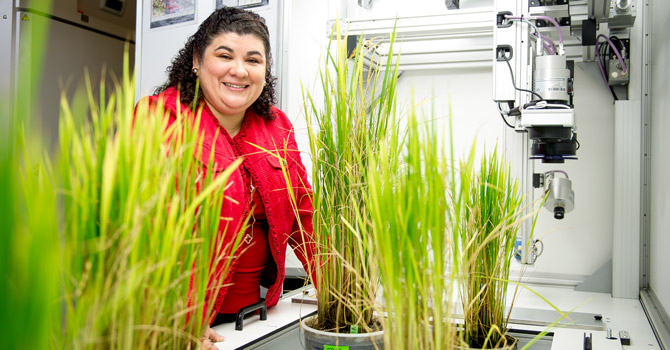Lorence is Co-PI for National Science Foundation Project to Study Heat Stress on Rice

Dr. Argelia Lorence
JONESBORO – The National Science Foundation (NSF) today announced funding of a large-scale proposal for which Dr. Argelia Lorence of Arkansas State University is co-principal investigator.
Lorence and colleagues from the University of Nebraska-Lincoln and Kansas State University are collaborating on the project, which is funded through NSF's Established Program to Stimulate Competitive Research (EPSCoR).
Lorence is a professor of metabolic engineering in the Department of Chemistry and Physics at A-State. As co-principal Investigator, her part of the funding is $1.19 million. Dr. Arlene Adviento-Borbe, one of the U.S. Department of Agriculture scientists who works in the Delta Water Management Research Unit on the A-State campus, also will have a key role.
The total grant is for $5.78 million over a four-year period beginning this month and continuing through July 2021. The project has potential to identify solutions to heat stress, one of the main environmental conditions causing lower yields in rice.
Dr. Harkamal Walia, with whom Lorence has previously worked, is the principal investigator for the project. He is an associate professor in the Department of Agronomy and Horticulture at UNL. Dr. Krishna Jagadish, associate professor in the Department of Agronomy at KSU, is the other co-principal investigator.
"This is a very exciting project as we will have the opportunity to study with state-of-the-art phenotyping tools how high night-time temperature stress affects the yield and quality of rice and wheat, the top two crops in the world," Lorence explained. Phenotyping is the process of identifying observable characteristics of an organism, such as biochemical or physiological properties, as determined by both genetic makeup and environmental influences.
Researchers will use a two-pronged approach, she explained, first performing experiments in a greenhouse where a sophisticated image-based phenotyping system will take high-resolution images of the plants as they are exposed to simulated high night-time temperature conditions.
Software will be used to processes the images, detecting daily differences among the varieties that are not visible to the human eye. Analysis of variations in each plant’s genetic makeup will help identify the genes responsible for heat tolerance.
"This analysis will be complemented with field studies in which we will use digital phenotyping and other non-destructive tools to identify rice and wheat cultivars with genetic and phenotypic markers tied to heat tolerance," she added.
Lorence will lead in the rice field work in Arkansas, the nation's top rice producing state, while Jagadish will lead the wheat field work in Kansas.
"My colleagues and I are hoping to gain a better physiological and genetic understanding of the heat stress responses. The knowledge we will gain in this four-year project will allow us to propose better strategies to improve rice and wheat’s tolerance to heat and contribute significantly towards global food security," Lorence continued. "Rice is one of the most important crops for global food security and the top crop in Arkansas. Rice provides 60 to 65 percent of the daily caloric intake for people in the lower economic strata who live on less than $1 per day, and it brings more than $6 billion to the Arkansas economy each year."
She added that educating the next generation of leaders in this multi-state, multi-disciplinary work is also a top priority.
"The research at A-State will provide in-depth learning opportunities to more than 40 undergraduate students and for multiple graduate students," Lorence continued. "We plan to build on the outstanding outreach program that the Plant Imaging Consortium, my current NSF EPSCoR project, has developed and we will bring high school students to participate in the project using mobile phone-based approach to characterize the phenotype of rice plants in the classroom."
# # #





